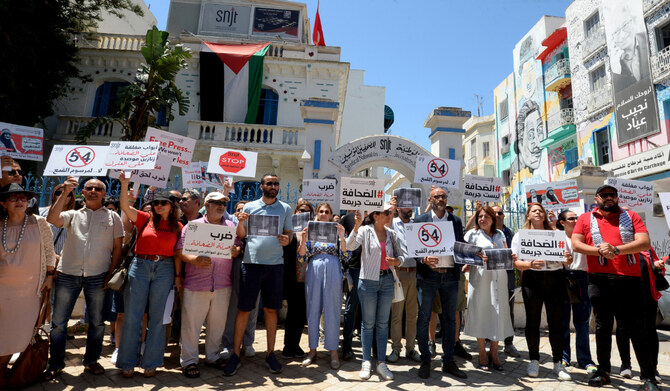TUNIS: Hundreds of Tunisians demonstrated Tuesday in the capital Tunis marking National Women’s Day and demanding the release of women detained for criticizing President Kais Saied, an AFP reporter saw.
Since a sweeping power grab in 2021 by Saied, a number of his critics, including women, have been arrested.
“Unfortunately, today is a day of anger for the women jailed because of their political views (and) their activism in society,” said Karima Brini, leader of the Women and Citizenship Association.
“We are angry and we demand freedom for the detained women.”
Chaima Issa, an opposition figure and member of the National Salvation Front coalition who was also imprisoned under Saied, deplored the arrests and conditions behind bars.
“I can only be in solidarity with them, because I experienced what they are currently experiencing,” she said, joining the rally that drew together factions from across the political spectrum.
Supporters of the Free Destourian Party also gathered near the Tunisian women’s ministry earlier in the day, calling for the release of the party’s leader, Abir Moussi, who has been jailed since October.
A staunch critic of Saied, Moussi was sentenced to two years in prison last week, two days after she submitted her candidacy for the presidential elections scheduled for October 6.
She was sentenced under Decree 54, a law enacted by Saied in 2022 to combat “false news.”
In July, lawyer Sonia Dahmani was sentenced to one year in prison over comments she had made about Tunisia in response to a TV pundit’s claim that sub-Saharan migrants were seeking to settle in the country.
She was also sentenced under Decree 54 after a court said her comments came in response to remarks by Saied.
In May, Saadia Mosbah, head of the Mnemty anti-racism association, was arrested and detained, hours after Saied lashed out at organizations helping migrants and called them “traitors and mercenaries.”
Mosbah has defended sub-Saharan African migrant rights after Saied said last year “hordes of illegal migrants” posed a demographic threat to Tunisia.
Rights groups have recently denounced an “authoritarian drift” and a “rollback” on freedoms in Tunisia, the birthplace of the Arab Spring uprisings.
Seeking a second term, Saied is set to face only two presidential challengers this fall after 14 hopefuls were rejected by the electoral authority and others were arrested.
















